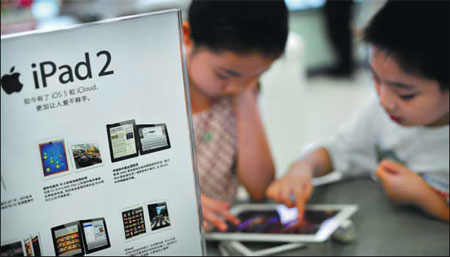Tablet taboos
 |
|
The current generation of children is exposed early to digital devices such as the iPad and other tablets and mobile computers. Provided to China Daily |
Fan Yifeng, a college teacher in Dalian, Liaoning province, bought his first iPad three years ago and now his family also owns Windows and Android tablets.
He allows his 9-year-old girl to play with the iPad for an hour every day.
"My daughter is loaded down with school work, so I want her to have some fun with the iPad," Fan says. "I always download the apps myself, and ask friends which are the good ones."
Cui Ying, a mother in Beijing, is also screening the apps downloaded on her tablet, and rationing time spent on the device.
Her secret is using educational apps that are updated often, but not too frequently.
Currently, her daughter has been playing with a games app that updates once a day after the 20-minute session is finished.
"When one session is over, she has to wait for a day before the next one comes," Cui says."Such apps are interesting and informative, but will not be addictive."
Cui is happy that her daughter is contented with her daily quota on the iPad, and her vision stays sharp.
"You can't stop kids playing iPad entirely. A better way is to make them realize the iPad is just another average toy," Cui says. "I don't see anything bad if it is used correctly."
Experts agree that parents need to supervise their children's time spent on watching television, the computer and now, mobile devices such as the tablet or cell phone. This is important for healthy physical and psychological development, they say.
Children have smaller eyeballs and have to exert their eye muscles to concentrate on small screens.
Prolonged sessions with iPad screen with animated texts, images and backgrounds will increase the likelihood of myopia and other eye problems.
The sedentary postures also aggravate the situation, according to Zhou Zhe, an ophthalmologist at Beijing Tongren Hospital.
















